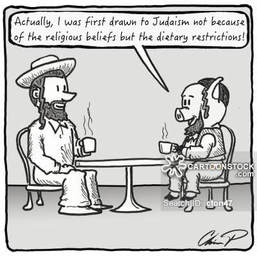
ואת־אלה תשׁקצו מן־העוף לא יאכלו שׁקץ הם את־הנשׁר ואת־הפרס ואת העזניה׃
ואת־הדאה ואת־האיה למינה׃ ...
... ואת החסידה
(Lev 11:13-19 CJB)
In Chulin 63a, the Talmud states that the Hebrew name for the white stork is חסידה, because it acts with kindness towards its friends.
The Rambam notes that most of the birds enumerated in this text are unfit for consumption because they are cruel scavengers, and that if so, due to its kindness, the stork should be allowed.
But the Kidushei Harim answers to this argument: "The stork does favor only for those that are his friends. Since it does not do kindness to strangers, it is considered unclean. Chesed, to be valid, must be practiced towards anyone, not just one's friends!"
It seems that the Master taught along the same lines.
When associating the injunction to love HaShem with all our hearts, mind, and possessions with the concept of loving our neighbor like ourselves, the Master was challenged with the question, 'Who is my neighbors? (Luke 10:30-37)
The Master addressed the challenge with a parable. In the parable, a traveler between Jerusalem and Jericho was attacked by robbers and was left for dead. A priest and a levite passed by him and left the man by the side of the road not wanting to soil their ritual purity with blood. Next came a Samaritan. Samaritans and Jews are enemies. This Samaritan showed compassion. He stopped and cared for the wounded Jew at his own expense. This was a true example of kindness that is not limited to one's own friends or kin.
The Master also said,
"You have heard that our fathers were told, 'Love your neighbor -- and hate your enemy.' But I tell you, love your enemies! Pray for those who persecute you! Then you will become children of your Father in heaven. For he makes his sun shine on good and bad people alike, and he sends rain to the righteous and the unrighteous alike. What reward do you get if you love only those who love you? Why, even tax-collectors do that! And if you are friendly only to your friends, are you doing anything out of the ordinary? Even the Goyim do that! Therefore, be perfect, just as your Father in heaven is perfect.
(Mat 5:43-48 CJB)
In all the previous examples of that chapter, the master elucidates the practical obedience of actual Commandments. But in this one He says, You have heard that our fathers were told, 'Love your neighbor -- and hate your enemy.'. To love our neighbor is a commandment but to hate one's enemy is not. Why did He then say that?
In this teaching, Yeshua was reacting to the dogmas and ethics of the society of his days. By mentioning that the fathers were told to hate their enemies, Yeshua was simply referring to one of these 'traditions of men' which negate the commandment of God. We are not asked to have 'good feelings' toward those who hate us, but the attitude we should have can be easily inferred through other commandments.
For example we are also told, Don't take vengeance on, or bear a grudge against any of your people; rather, love your neighbor as yourself; I am Adonai (Lev 19:18). We usually bear a grudge against people who have been mean to us and did things to hurt us; people who by their actions become our enemies. . We are told, "Do not murder." (Exo 20:13.) We usually want to murder people we either hate or don't care about, while all the time, we are commanded, "Love your neighbor as yourself; I am Adonai."
It was usual for Rabbis to 'build fences' around the commandments in order to make it impossible to break them. To 'love your enemy' is a fence against hating, bearing a grudge, or murdering them. Some may object to the idea of a 'fence around the commandment' claiming it is nothing more than a commandment of man but Yeshua's teachings in Matthew 5-6-7 are based on that very idea, so Yeshua seemed to agree with fences around the commandments to protect them..
Here is a story to illustrate how they work.
A rich Englishman living in hilly area of the country needed to hire a new driver so he set up an ability test. He asked each candidate to drive in the safest way possible close to the cliff.
Each candidate tried to drive as close as possible to the deadly ravine to their left (Brits drive on the left side) until one finally one drove as far as possible away from the cliff, actually hugging the right side of the hill. "That is the safest way to drive close to the hill!" he said. He was hired.
It is the same with the commandments. We should live our lives as far away possible from the "deadly 'cliff" of disobedience (For what one earns from sin is death Rom 6:23) as possible. That's what it means to put a fence around the commandment!
In in his teaching on Matthew 5: 43-48, Yeshua also equates the ability to love and pray for one's enemies with being "perfect", just like the Father in Heaven who "makes his sun shine on good and bad people alike, and he sends rain to the righteous and the unrighteous alike" is "perfect".
We must always remember that:
We were reconciled with HaShem through the death of His Son, as we were still enemies, ...
(Rom 5:10 CJB)
WE MUST THEREFORE EXTEND TO OTHERS THE SAME MERCY HE EXTENDED TO US BECAUSE
"For the way you judge others is how you will be judged.
The measure with which you measure out will be used to measure to you. "
(Mat 7:2 CJB)
 RSS Feed
RSS Feed